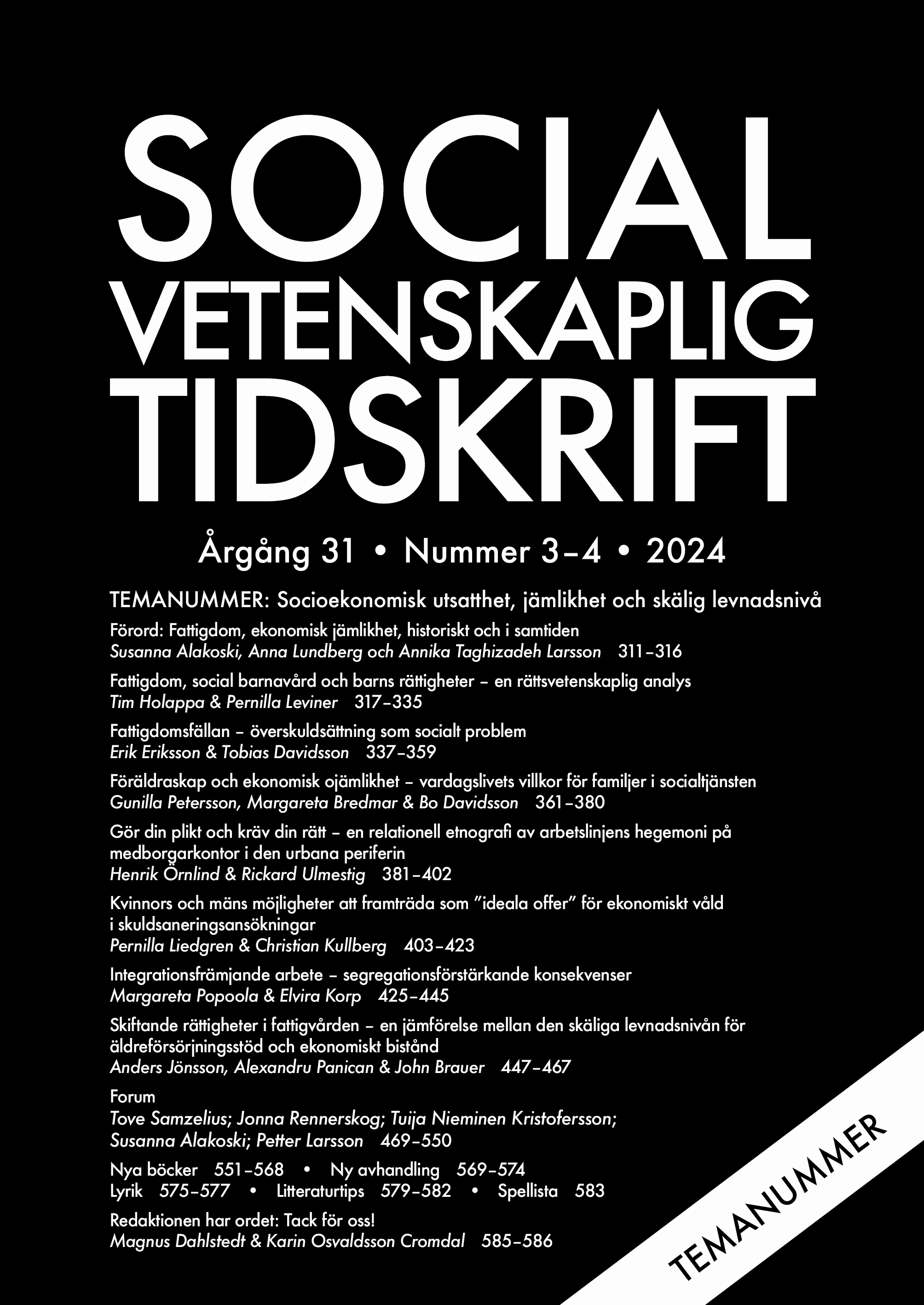Föräldraskap och ekonomisk ojämlikhet
– vardagslivets villkor för familjer i socialtjänsten
DOI:
https://doi.org/10.3384/SVT.2024.31.3-4.5632Nyckelord:
Social Sevices, inequality, families, children, parentingAbstract
Parenting and economic inequality –everyday life in families with social service involvement
Families in social services and child protection agencies often live under strained economic conditions. However, this is not always the truth. This article addresses the economic and social differences of families in contact with the Swedish social services. Empirically the article relies on life-course interviews with mothers in four families. Using Bourdieu’s concepts of economic, social and cultural capital the analysis highlights how inequal conditions of everyday life interplay with the lives of families from different economical positions and their relationships with the social services. The analysis describes that the better-off families are quite content with the help they get from the social services. The families with smaller economic resources however, are not only less satisfied, but also feel a lack of recognition from the services regarding their needs.
Referenser
Andersen, S.H. & Fallesen, P. (2010) A question of class: on the heterogeneous relationship between background characteristics and a child’s placement risk. Children and Youth Services Review, 32: 783–789. doi:10.1016/j.childyouth.2009.10.003.
Bernard, C. & Greenwood, T. (2019) Recognizing and addressing child neglect in affluent families. Child & Family Social Work, 24: 340–347. doi:10.1111/cfs.12619.
Bjurman, E-L. (1981) Barn och barn: om barns olika vardag. Lund: Liber Läromedel.
Bourdieu, P. (1984) Distinction: a social critique of the judgement of taste. London: Routledge and Kegan Paul.
Bourdieu, P. (1985) Social space and the genesis of groups. Theory and Society, 14: 723–744.
Bourdieu, P. & Wacquant, L. (1992) An invitation to reflexive sociology. Cambridge: Polity Press.
Braun, V. & Clarke, V. (2006) Using thematic analysis in psychology. Qualitative Research in Psychology, 3: 77–101. [https://doi.org/10.1080/26895269.2022.2129597].
Braun, V. & Clarke, V. (2022) Toward good practice in thematic analysis: avoiding common problems and be(com)ing a knowing researcher. International Journal of Transgender Health, 24(1): 1–6. [https://doi.org/10.1080/26895269.2022.2129597].
Bredmar, M., Davidson, B., Leinhard, H. & Petersson, G. (2014) Pengarna, barnen och livet: en studie av familjer med sammansatta problem och deras möte med socialtjänsten. FoU-rapport 76:2014. Linköping: FoU Centrum för vård, omsorg och socialt arbete.
Bywaters, P., Brady. G, Sparks, T. & Bos, E. (2016) Inequalities in child welfare intervention rates: the intersection of deprivation and identity. Child & Family Social Work, 21: 452–463. doi:10.1111/cfs.12161.
Coleman, J.S. (1988) Social capital in the creation of human capital. American Journal of Sociology, 94: 95–120.
Daly, M. & Kelly, G. (2015) Families and poverty: everyday life on a low income. Bristol: Polity Press.
Davidson, B. & Bredmar, M. (red.) (2012) Familjer i socialtjänsten: levnadsvillkor, livssituation och erfarenhet av socialtjänst. FoU-rapport 68:2012. Linköping: FoU Centrum för vård, omsorg och socialt arbete.
Featherstone, B., Morris, K., Daniel, B. & Bywaters, P. m.fl. (2017) Poverty, inequality, child abuse and neglect: changing the conversation across the UK in child protection? Children and Youth Service Review, 97: 127–133. doi:10.1016/j.childyouth.2017.06.009.
Fernqvist, S., Flinkfeldt, M., Näsman, E. & Ponton von Gerber, C. (2020) Barnfattigdom: barnfamiljer och professionellas perspektiv. Lund: Gleerups.
Fong, K. (2017) Child welfare involvement and contexts of poverty: the role of parental adversities, social networks and social services. Children and Youth Services Review, 72:5–23. doi:10.1016/j.childyouth.2016.10.011
Franzén, E., Vinnerljung, B. & Hjern, A. (2008) The epidemiology of out-of-home care for children and youth: a national cohort study. British Journal of Social Work, 38: 1043–1059. doi:10.1093/bjsw/bcl380.
Garrett, P.M. (2013) Social work and social theory: making connections. Bristol: Polity Press.
Hawkins, R.L. & Maurer, K. (2012) Unravelling social capital: disentangling a concept for social work. British Journal of Social Work, 42(2): 353–370. doi.org/10.1093/bjsw/bcr056.
Healy, K. & Hampshire, A. (2002) Social capital: A useful concept for social work? Australian social work, 55 (3): 227–238. doi:10.1080/03124070208410978
Hennum, N. (2011) Controlling children’s lives: covert messages in child protection service. Child and Family Social Work, 16: 336–344. doi:10.1111/j.1365-2206.2010.00744.x
Hennum, N.M.J. (2012) Children’s confidences, parents’ confessions: child welfare dialogues as technologies of control. Qualitative Social Work, 11(5): 535–549. doi:10.1177/1473325011408175.
Hiilamo, A., Keski-Säntti, M., Niemelä, M. & Ristikari, T. (2023) The increasing association between child poverty and children in out-of-home care: an ecological longitudinal analysis of Finnish municipalities in the period 1992–2021. Child Abuse & Neglect, 145. doi:10.1016/j.chiabu.2023.106395.
Innes-Turnill, D. (2023) Child abuse, the narratives of parents living in poverty: a critical analysis of parental and professional explanations of why a child was harmed. Journal of Social Work Practice, 37(2): 183–197. doi:10.1080/02650533.2023.2199195.
Kim, H., Drake, B. & Jonson-Ried, M. (2018) An examination of class-based visibility bias in national child maltreatment reporting. Child and Youth Services Review, 85: 165–173. doi:10.1016/j.childyouth.2017.12.019.
Krumer-Nevo, M. (2016) Poverty-aware social work: a paradigm for social work with people in poverty. The British Journal of Social Work, 46(6):1793–1808. doi:10.2307/26363587.
Lareau, A. (2011) Unequal childhoods: class, race, and family life (2 uppl.) Berkeley: University of California Press.
Lewis, O. (1965/1968) La Vida. A Puerto Rican family in the culture of poverty: San Juan and New York. New York: Vintage Books.
Lundström, T. & Sallnäs, M. (2003) Klass, kön och etnicitet i den sociala barnavården. Socialvetenskaplig tidskrift, 10(2-3). doi: 10.3384/SVT.2003.10.2-3.2658.
Mitchell, G. & Campbell, L. (2011) The social economy of excluded families. Child and Family Social Work, 16: 422–433. doi:10.1111/j.1365-2206.2011.00757.x
Morris, K., Mason, W., Bywaters, P. & Featherstone, B. m.fl. (2018) Social work, poverty, and child welfare interventions. Child & Family Social Work, 23: 364–372. doi:10.1111/cfs.12423
Nordby, H. (2011) Värderingar som socialt kapital. I: B. Starrin & R. Rønning (red.) Socialt kapital: i ett välfärdsperspektiv. Malmö: Liber.
Odenbring, Y. (2019) The daily life and reality behind child poverty in Sweden: children’s and adolescents’ voices. Child Indicators Research, 12: 847–859. doi:10.1007/s12187-018-9558-z.
Patton, M.Q. (2002) Qualitative research and evaluation methods (3 uppl.). London: Sage.
Pelton, L.H. (2015) The continuing role of material factors in child maltreatment and placement. Child Abuse & Neglect, 41: 30–39. doi:10.1016/j.chiabu.2014.08.001.
Putnam, R.D. (2015) Our kids: the American dream in crisis. New York: Simon & Schuster.
Riessman, C.K. (1997) Berätta, transkribera, analysera: en metodologisk diskussion om personliga berättelser i samhällsvetenskapen. I: L-C. Hydén & M. Hydén (red.) Att studera berättelser: samhällsvetenskapliga och medicinska perspektiv. Stockholm: Liber.
Russell, M., Harris, B. & Gockel, A. (2008) Parenting in poverty: perspectives of high-risk parents. Journal of Children and Poverty, 14(1): 83–98. doi:10.1080/10796120701871322.
Saar-Heiman, Y. & Gupta, A. (2020) The poverty-aware paradigm for child protection: a critical framework for policy and practice. British Journal of Social Work, 50: 1167–1184. doi:10.1093/bjsw/bcz093.
Saar-Heiman, Y., Nahari, M. & Krumer-Nevo, M. (2023) Critical social work in public social services: poverty-aware organizational practices. Journal of Social Work, 23(3): 503–521. doi:10.1177/14680173221144204.
Sanfelici, M. (2023) Learning from the experience of parents in poverty: the power of recognition. Child & Family Social Work, 28: 258–267. doi:10.1111/cfs.12958.
Smithson, R. & Gibson, M. (2017) Less than human: a qualitative study into the experience of parents involved in the child protection system. Child and Family Social Work, 22: 565–574. doi:10.1111/cfs.12270.
Webb, S.A. (2006) Social work in a risk society: social and political perspectives. Basingstoke: Palgrave Macmillan.
Wildeman, C. & Fallesen, P. (2017) The effect of lowering welfare payment ceilings on children’s risk of out-of-home placement. Children and Youth Service Review, 71: 82–90. doi:10.1016/j.childyouth.2016.10.017.
Vinnerljung, B. (1998) Socialt arv. I: V. Denvall & T. Jacobson (red.) Vardagsbegrepp i socialt arbete: ideologi, teori och praktik. Stockholm: Norstedts Juridik.
Yona, L. & Nadan, Y. (2021) Mind the gap: parental and professional perceptions of ”risk” for children living in poverty. Child and Family Social Work, 26: 582–591. doi:10.1111/cfs.12840.
Zilberstein, K. (2016) Parenting in families of low socioeconomic status: a review with implications for child welfare practice. Family Court Review, 54(2): 221–231. doi:10.1111/fcre.12222
Downloads
Publicerad
Referera så här
Nummer
Sektion
Licens
Copyright (c) 2024 Gunilla Petersson, Margareta Bredmar, Bo Davidson

Det här verket är licensierat under en Creative Commons Erkännande 4.0 Internationell-licens.




